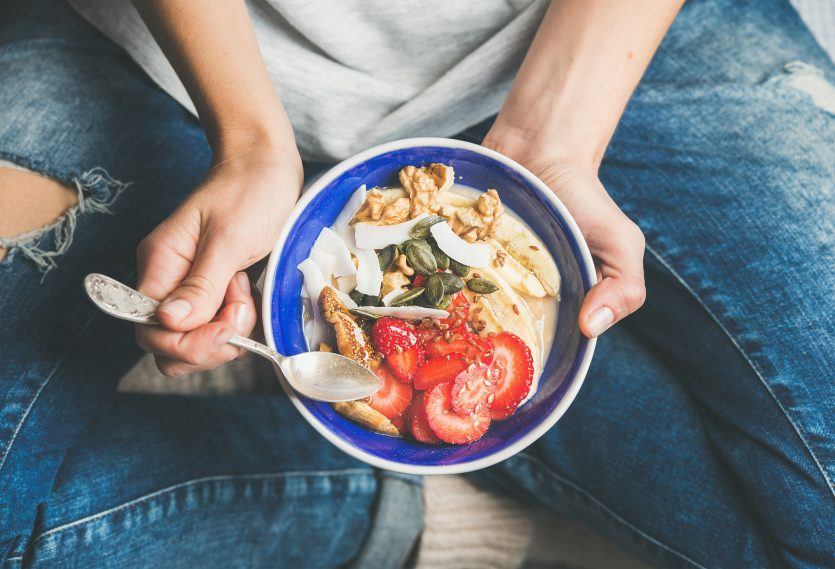A Healthy Breakfast, a Healthy Start

www.askthescientists.com
After a good night’s rest, you’re recharged and ready to take on a new day. It’s important to fuel your body with the energy it needs to get work done. Eating a healthy breakfast is your best bet and sets you up for your entire day ahead.Even if you aren’t hungry in the morning, it’s a good idea to eat a healthy breakfast. And it can come in many shapes and sizes. But there are a few things you can do to maximize your morning meal.
Amp up the Protein
Protein is an important component of a healthy diet. Many scientific studies have shown that consuming a high-protein breakfast reduces the urge to snack on high-fat and high-sugar treats. Eggs, yogurt, and lean meats provide the fuel your body needs to make it through the day. These foods are rich in protein and provide long-lasting energy.Your muscles also need protein to stay in shape. Your recommended amount of protein per day depends on your weight. It’s 0.8 grams per kilogram of weight (or 0.36 grams per pound). To find your number, multiply your weight in kilograms by 0.8 or your weight in pounds by 0.36. For example, if you’re 70 kilograms (155 pounds), you need to get at least 56 grams of protein each day to supply energy and maintain muscle mass. Divide your daily protein requirement by your number of meals to find how much protein you need for breakfast.
Plugging protein into your healthy breakfast can help throughout the day. You can fight your snack cravings and maintain your muscles by starting each day with a protein-packed breakfast.
Choose Low-Glycemic Options
The glycemic index is a measure of how quickly your body absorbs sugar. Sugar, or carbohydrates, are an important and essential part of a healthy diet. But you have to be deliberate in the carbohydrates you chose.When you opt for high-glycemic options, your blood sugar quickly spikes. This isn’t healthy and your body knows it. As a response, it dumps a lot of hormones into our blood stream (the major one of course is insulin) to coax your cells to absorb it—quickly.
As a result, even more quickly than your blood sugar rises, it comes crashing down. This can result in low blood sugar (also an unhealthy circumstance). When this happens, you can feel tired and lose focus. The response is your brain telling you to eat something—and anything—quickly. As a result, you reach for the closest thing (snack), which tends to be an unhealthy option.
To break this high-glycemic rollercoaster ride, choose carbohydrates that are absorbed more slowly to keep your blood-sugar levels low. This will also help you keep feeling full for longer and will provide a longer-term source of energy for your body (and brain) to use. And because your blood sugar won’t come crashing down, you get hungry slowly and this gives you time to make healthy food choices for your upcoming meals.
It has also been shown that people who eat breakfast—and especially low-glycemic breakfasts—tend to eat fewer calories through the day.
Choose Whole Grains for a Healthy Breakfast
Now that you have the protein taken care of, let’s help you chose the healthy carbohydrates in your breakfast. Here you want to focus on fiber. That’s because it aids in digestion and keeps you feeling full after a meal.Whole grains have higher fiber content than their refined counterparts and are better for you. By choosing whole grains, your body can help maintain steady blood sugar and avoid sudden spikes or drops. Whole grain foods help maintain healthy cholesterol already in the normal range and support heart health.
Phytonutrients (nutrients derived from plants) are also abundant in whole grains. They’re important because your body can’t make these essential compounds. Eating whole-wheat toast, or whole-grain cereals can increase the fiber and phytonutrients in your diet and will help you stay full throughout the day.
Skip the Juice, Go with Fruit
Fruit juice is a tempting choice when preparing breakfast. Unfortunately, these drinks are high in sugar, low in fiber, and associated with negative health effects.So, juices aren’t the best choice for a healthy breakfast. Going with whole fruit is more nutritious. Whole fruit can satisfy a craving for sweets and has the added benefit of fiber, which helps support healthy digestion.
Some of the best fruits to eat at breakfast are berries, grapefruit, and bananas. Berries are loaded with antioxidants and help maintain cellular vitality. Grapefruit is full of fiber and can fill you up faster than pastries and sweet drinks. Bananas are packed with potassium, vitamin C, and other vitamins and minerals. These micronutrients help maintain a healthy body and sustain you throughout the day. And bananas are easy to grab and take with you when you’re in a hurry.
Be Smart About Your Fat Selection
Fat isn’t a bad word. It’s one of the essential macronutrients and provides a great source of sustained energy. Fat can even help you feel full longer. But you have to be selective about the type of fat you choose and be careful about the extra calories they add.That’s because not all fats are created equal. Trans fats—like margarine—should be avoided altogether. For other fats, you should first consider the source.
An avocado and a pork sausage patty both contain fat. But it’s pretty easy to guess which one is better for your body. As a general rule, fats that come from plants are usually healthier and fats that come from animals are usually less healthy.
So, don’t skip the fat. Just be smart about your selection.
What You Drink Matters
When you find yourself in need of a morning beverage, look to water, coffee, and tea instead of caffeinated soda, juice, or energy drinks—even so-called “diet” options. These sugary beverages can spike blood sugar, dehydrate your body over the course of the day, and in the case of diet beverages, even trigger you to snack more.Water provides lasting hydration and helps your body function optimally. Tea and coffee are natural sources of energy boosting caffeine and have been shown to activate the areas of the brain that keep you alert and focused. Green, white, black, and herbal teas are also valuable sources of phytonutrients and antioxidants. These compounds are important for supporting healthy cell and immune function.
Pair Your Favorite Healthy Breakfast with Nutritional Supplements
Even when you try to eat right, your nutrient supply can fall short of your daily needs. Multivitamins are quick, easy ways to ensure your body has all the vitamins and minerals it needs to keep your engine running smoothly.Nutritional supplementation, as recommended by your healthcare provider, helps close the gap between what your body needs and what your diet provides. Supplements can optimize the efficiency of your cellular communication, help support your immune system, and help you turn the macronutrients you just ate (protein, carbohydrates, and fats) into the energy your body needs for the day.
Start your day with a healthy breakfast and a multivitamin to put your body in the best position for success.
Easy Ways to Make Better Breakfast Choices
Eating a healthy breakfast doesn’t have to be difficult. Small changes and substitutions to your current breakfast routine could be enough to improve your morning nutrition.Here are some simple ways to have a better breakfast today:
- Substitute white bread with a whole-grain alternative.
- Try to avoid most cold cereals. Even what looks to be the healthiest choice tends to be high glycemic.
- Drink tea or other healthy beverages instead of juice. If you need to sweeten, use natural sweeteners like stevia or agave nectar.
- In a hurry? Make sure your on-the-go breakfast includes a fruit/vegetable, protein, a smart fat, and whole grains. A piece of fruit, hard-boiled egg, and whole-wheat bagel will fill you up, fuel your busy day, and help you make smart eating choices later on. Or alternatively, a low-glycemic meal replacement shake can be quick, healthy, on-the-go option.
- Take a multivitamin at breakfast each day. After you make it a habit, taking your vitamins will be easy to remember.
About the Author
Sydney Sprouse is a freelance science writer based out of Forest Grove, Oregon. She holds a bachelor of science in human biology from Utah State University, where she worked as an undergraduate researcher and writing fellow. Sydney is a lifelong student of science and makes it her goal to translate current scientific research as effectively as possible. She writes with particular interest in human biology, health, and nutrition.References
https://www.hsph.harvard.edu/nutritionsource/whole-grains/http://www.tandfonline.com/doi/abs/10.1080/07315724.2003.10719307
https://www.huffingtonpost.com/2013/03/28/protein-breakfast-prevent-snacking_n_2971476.html
https://www.huffingtonpost.com/2013/05/15/healthiest-foods-breakfast-superfoods_n_3275476.html?slideshow=true#gallery/297224/6
https://www.ncbi.nlm.nih.gov/pubmed/17514538
https://www.nature.com/articles/ejcn2010247
From Deanna: I start my day out with a Usana nutritional shake, called Nutrimeal, sometimes adding berries. I love the balance of protein, carbohydrates and healthy fats.


